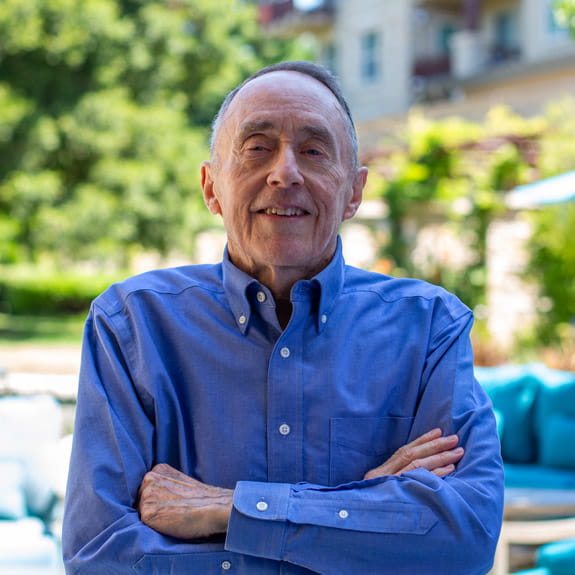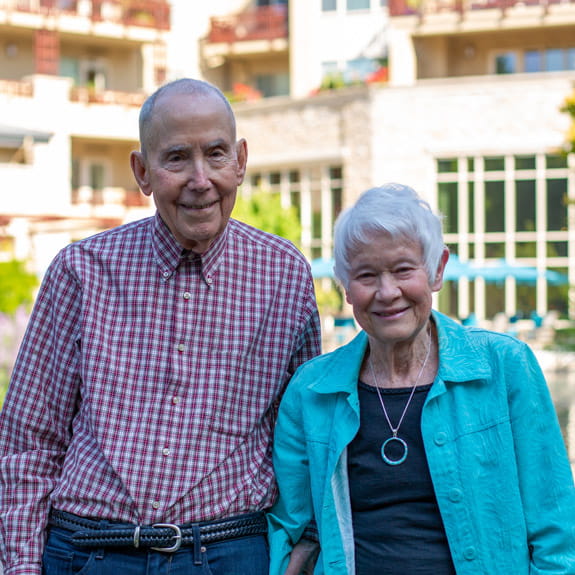For residents of Vi at Palo Alto, living a rich and cultured life in retirement isn’t just a nice-to-have—it’s indispensable to continue to grow, learn, and discover new passions. An essential element that helps create that full and balanced lifestyle is access to culturally diverse experiences and educational opportunities.
Whether it’s attending a lecture from a compelling and wide-ranging line-up of speakers or enjoying globally inspired cuisine through the dining program, there’s no shortage of options for residents to learn about different ways of life and discover new perspectives on a day-to-day basis.
But the members of the Diversity Committee, part of the Resident Council, believe there’s an opportunity to further broaden the perspectives of their neighbors by working to increase the diversity of the community’s resident base. The committee’s work dovetails with Vi’s corporate REDI (Respect, Equity, Diversity and Inclusion) initiative, which is designed to foster an inclusive, collaborative, supportive, and respectful environment among Vi employees.
Resident Dave Pollard founded the Diversity Committee, with the help of Vi staff, shortly after he and his wife moved to Vi at Palo Alto in 2019. While they immediately enjoyed connecting with their fellow residents, they noticed the community could benefit from greater diversity – something they had become accustomed to in a university setting.
Dave, who graduated from Stanford University’s School of Earth Sciences in 1969 and is now a professor emeritus for the same department, played a key role in the department’s shift from comprising majority white, male academics to the makeup of genders, races, ethnicities and backgrounds that it has today.
“We knew this place would be even richer and more interesting with a more diverse resident population,” he said.

Residents joined the committee for many reasons, from a shared interest in diversity and inclusion to past life experiences that led them to want to gather with others to work toward a more diverse community of neighbors.
Diversity became especially important to committee co-chair Tom Ehrlich when he entered the Army Reserves as a young man and shared barracks with men from a wide range of backgrounds. Tom also fostered a dedication to social justice throughout his career, including working with a federal agency that provided civil legal services for low-income Americans.
Later, in his time as a university president, Tom worked with Black students to help build a Black Student Center, a process which he says helped him better understand their unique challenges at the institution.

“When I learned that there was a Diversity Committee [at Vi], I knew it was something I really wanted to be involved in,” said Tom. “It's been part of my life all my professional life, and I didn't want to stop now.”
His committee co-chair Linda Williams has lived in many communities across the United States, meeting new people and learning about different cultures – from customs to cuisines – at every step of the way. In her professional life, Linda has served on several committees and boards devoted to diversity.
“Increased diversity would give us all the ever-present ability to continue to expand our horizons at home,” said Linda, “no matter how much or how little we are able to travel.”
The committee’s work began with open conversations, both within the committee as well as with the wider community.
“We wanted to communicate why we’re doing this, what diversity means to us, and what our efforts will mean in the community,” said Dave.
With help from an educational psychology Ph.D. student at Stanford, the committee recently launched a community-wide survey to gauge residents’ thoughts about diversity and inclusion efforts. The initiative saw a 75% response rate, indicating an overall shared enthusiasm for this work.
The committee, which has grown to more than 20 members, keeps up visibility by publishing its meeting minutes, sharing resident essays and penning reviews of diversity-related books in the community newsletter.
This year the group is focusing on eight goals, each with their own action items that work towards the shared objective of increasing diversity at Vi at Palo Alto by making everyone feel not just welcome to join the community, but valued and included after they move in.
To introduce more diverse prospective residents to the community, the committee has invited local nonprofit boards with diverse memberships to hold meetings at the community (complete with a tour before they leave).
The committee has also made progress toward its goal of programming a diverse lineup of speakers, giving residents more opportunities for continued education and learning. Recent talks have included Claudia Steele on “How to Achieve a Diverse Committee,” Judge LaDoris Cordell on her book, Her Honor: My Life on the Bench, Al Camarillo on “Planting the Seeds of Race & Ethnic Studies on the Farm,” and William B. Gould IV on “NCAA and Pay for Student Athletes.”
“We’re not only bringing in great speakers for our residents, but we’re also opening our doors to new folks and introducing them to a great place to spend retirement,” Dave said.
“Fortunately, there really is strong support throughout the community,” said Tom.
Vi at Palo Alto Executive Director John Koselak has thrown his support behind the push by designating a staff liaison between Vi administration and the committee. The committee also collaborates with Director of Sales Robert Knigge.
“Greater resident diversity will help expand the richness and culture of our community and help many of our current residents feel more included and celebrated,” Koselak said. “And our committee work at Vi at Palo Alto also complements our corporate REDI initiative.”
Linda is optimistic about the eventual success of their efforts. “There are a number of people who are not officially committee members or volunteers who are assisting our effort, which is very rewarding,” said Linda.
Glad to be connected!
We're so glad you reached out!
We’ll be in touch soon to share expert insights and resident perspectives that we hope are helpful, and one of our team members will also be reaching out to answer any questions you may have.
